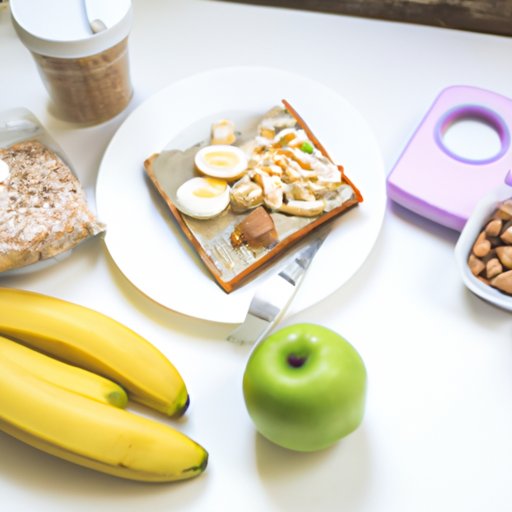Introduction
For many people, getting in a good workout is only half the battle — the other half is knowing what to eat afterwards. Eating after a workout is essential for replenishing your energy stores, maximizing results and aiding muscle recovery. But with so much conflicting advice out there, it can be hard to figure out what’s best.
In this article, we’ll explore the basics of post-exercise nutrition, including what to eat after working out, the science behind eating after exercise and tips for healthy post-workout snacking.

What to Eat After Working Out
In general, you should aim to consume a combination of protein, carbohydrates and fluids after a workout. Protein helps your muscles heal and rebuild, while carbs help restore your body’s glycogen levels. Fluids are important for rehydrating your body and replacing lost electrolytes.
An Overview of Nutrient-Dense Foods to Recharge Your Body
When choosing foods for post-exercise meals, look for nutrient-dense options that provide a balance of protein, carbohydrates and healthy fats. Good choices include lean meats, whole grains, fruits, vegetables, nuts, seeds and dairy products. Examples of post-workout snacks include yogurt and berries, a banana with peanut butter, or a turkey sandwich on whole-grain bread.
Meal Ideas for Refueling After Exercise
If you’re looking for some meal ideas for refueling after exercise, here are a few suggestions:
- Grilled chicken with roasted vegetables and brown rice
- Salmon with quinoa and steamed broccoli
- Tuna salad wrap on whole-wheat bread
- Egg omelet with spinach, mushrooms and sweet potatoes
- Oatmeal topped with fresh fruit and nuts
The Science Behind Eating After Exercise
Now that we’ve covered what to eat after exercising, let’s take a closer look at why it’s important. Here’s a brief overview of the science behind post-exercise nutrition.
How Eating Post-Workout Can Help You Maximize Results
Eating after a workout helps maximize results by providing your body with the nutrients it needs to recover and repair itself. Without adequate nutrition, your body won’t be able to build muscle or gain strength as quickly. Additionally, eating after exercise can help prevent fatigue and reduce soreness, allowing you to hit the gym more often.
Understanding the Role of Glycogen and Protein in Muscle Recovery
Glycogen is a form of stored energy that your body uses during exercise. Consuming carbohydrates after a workout helps replenish your glycogen stores and gives your body the energy it needs to recover. Protein, on the other hand, helps your body build and repair muscle tissue. For optimal muscle recovery, it’s important to consume both carbs and protein after a workout.
How Long Should You Wait to Eat After a Workout?
Timing is also key when it comes to post-exercise nutrition. Knowing how long to wait to eat after a workout can help ensure that your body gets the nutrients it needs when it needs them.
Factors That Influence Post-Exercise Nutrition
Several factors can influence how long you should wait to eat after a workout, including the type of exercise you did, the intensity of your workout and your individual needs. Generally speaking, if you did an intense workout, you should aim to eat within 30 minutes of finishing. If you did a moderate or low-intensity workout, you may have up to two hours before you need to eat.
Recommended Timeframes for Eating After Exercise
To maximize results and aid muscle recovery, it’s best to consume a combination of protein, carbohydrates and fluids within 30 minutes of exercising. This will help replenish your glycogen stores and give your body the nutrients it needs to repair and rebuild muscle tissue.
Tips for Healthy Post-Workout Snacking
Finally, let’s take a look at some tips for healthy post-workout snacking. Here are a few practical strategies for eating after exercise.
Practical Strategies for Eating After Exercise
- Prepare healthy snacks ahead of time, so they’re ready to go when you finish exercising.
- Carry a water bottle with you and sip throughout your workout to stay hydrated.
- Keep a variety of snack bars, trail mix and other portable snacks in your gym bag for quick refueling.
- Choose nutrient-dense foods that provide a balance of protein, carbs and healthy fats.
- Make sure to drink plenty of fluids after a workout to replace lost electrolytes.
Smart Alternatives to Sugary Sports Drinks
Sports drinks can be a convenient source of carbs and electrolytes, but they are often high in sugar. If you’re looking for an alternative, try coconut water or a homemade electrolyte drink made with lemon juice, salt and honey. You can also make a smoothie with almond milk, frozen fruit and Greek yogurt for a nutritious post-workout snack.
Conclusion
Eating after a workout is essential for replenishing your energy stores, maximizing results and aiding muscle recovery. To get the most out of your workouts, aim to consume a combination of protein, carbohydrates and fluids within 30 minutes of exercising. Look for nutrient-dense foods that provide a balance of these macronutrients, and consider carrying some portable snacks with you for quick refueling.
By following these tips, you can make sure your body gets the nutrition it needs to perform at its best. With a little planning and preparation, you can make post-exercise nutrition part of your regular routine.
(Note: Is this article not meeting your expectations? Do you have knowledge or insights to share? Unlock new opportunities and expand your reach by joining our authors team. Click Registration to join us and share your expertise with our readers.)
